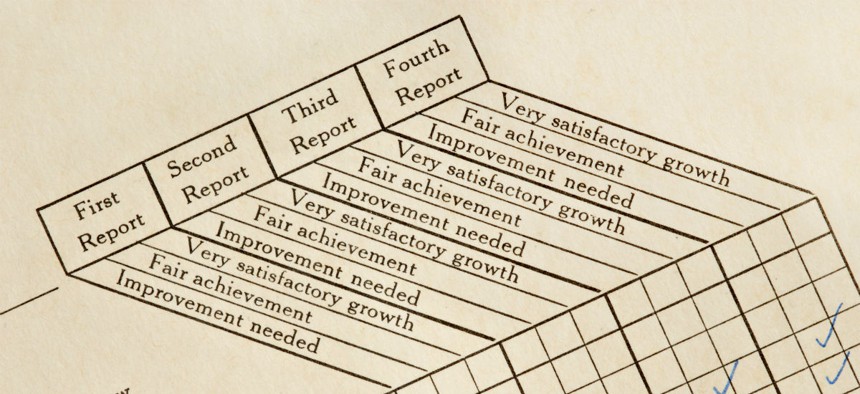
Obama Administration’s New Performance Grade: Improved, But Work Remains
The worst ratings related to cutting programs, practices or policies that aren't working.
The Obama administration has made substantial progress in measuring federal program effectiveness, but more needs to be done to shift federal funding to programs that work, according to a scorecard released Monday by Results for America, a bipartisan advocacy organization that supports greater performance in government.
"This administration believes in the power of evidence," said OMB Director Shaun Donovan at an event announcing the new ratings. "Evidence should drive policy decisions. We need to do what works and stop doing what doesn't."
The scorecard rated seven federal agencies, both domestic and international, including the Department of Education, HUD, Department of Labor, and USAID. It was assembled after consulting with more than 75 current and former federal officials and other experts earlier this year.
Most of the rated agencies have made significant progress in embedding the use of performance data and program evaluations in their decision-making, according to the report. It commended the administration for strengthening federal evaluation offices, adopting agencywide evaluation policies and research agendas, and building out information clearinghouses like the Department of Education's What Works Clearinghouse.
The agencies received lower scores on integrating performance information into the federal grantmaking process, however. The administration received its worst ratings on cutting or shifting funding away from programs, practices or policies that were not working.
"That's where it gets tough," said John Bridgeland, former head of the Domestic Policy Council under President George W. Bush. "Where there’s evidence that something is not working, do people have the courage to cut it?" he asked.
“Every program out there has advocates—in Congress, among interest groups, and within the executive branch—and they often see rigorous evaluation as a threat,” said Andrew Feldman, a visiting fellow at the Brookings Institution who previously served on the evidence team at the Office of Management and Budget.
“An important message that evidence advocates have tried to send—and need to keep sending—is that evidence and evaluation can be a tool for program improvement,” he said.
In his remarks, Donovan seemed to agree. "Too often the history of performance management and evidence has used a ‘gotcha’ approach," he said, referencing the early history of initiatives such as CompStat in New York City. "We have started to focus on how you find ways to improve programs and make them work better."
Some were skeptical. “You can't really spend smarter or have an outcomes-based social sector when you insist on funding ineffective social programs,” wrote David Muhlhausen, a research fellow from the conservative Heritage Foundation who was live-tweeting the event.
The administration remains committed to the focus on continuous improvement, however.
"We don't just want to know what works, but for whom and under what circumstances," said Naomi Goldstein, Deputy Assistant Secretary for Planning and Evaluation at the Administration for Children and Families. "We are asking more nuanced questions."
The administration also wants to help nonprofit social service providers and other organizations prepare for coming changes in federal funding.
"We spend billions of dollars on technical assistance," said David Wilkinson, director of the White House Office of Social Innovation. "How can we help service providers use the data to course correct and improve?"
Wilkinson suggested that federal contractors and nonprofits will need to adapt to the growing focus on outcomes-based funding. In recent weeks the administration has announced significant changes in health care financing, for example, including greater reliance on value-based payments in Medicare.
Other consumer-facing organizations, like colleges and universities, may also face stepped-up pressure for improved performance. Students are increasingly gaining access to information on graduate earnings through services like the College Scorecard, which provides ratings for 7,000 post-secondary institutions. According to Department of Education officials, 1.3 million unique users have already accessed the site.
The administration also used Monday's event to announce new grants under a pay-for-success program run by the Social Innovation Fund, a signature Obama administration initiative.
Congressional Republicans have claimed similar victories. "Republicans like this effort," said Bridgeland, the former Bush administration official. "Republicans believe in limited government, but they think that limited government should be effective."
Bridgeland pointed to the recent creation of an Evidence-based Policy Commission, which is expected to help make government data more widely available and was championed by House Speaker Paul Ryan. Late last year the Republican Congress also passed major new legislation that will boost the role of evidence in education.
Obama administration officials agree that the focus on evidence and data has been bipartisan.
"I have worked in three different administrations, both Democrat and Republican," said Goldstein. "I found high-level appointees in all three that were committed to building and using evidence."
Patrick Lester is the director of the Social Innovation Research Center.






